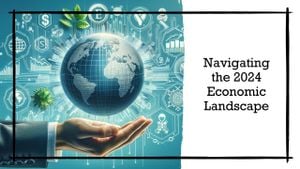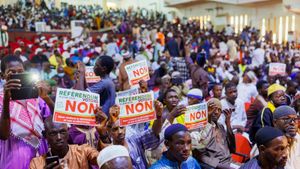Uruguayans cast their votes on October 27, 2024, marking a pivotal moment as they participated in presidential elections poised to change the country's political winds. The atmosphere was thick with anticipation, especially as the leftist candidate, Yamandú Orsi from the Frente Amplio party, emerged as the frontrunner against the incumbent conservative government represented by President Luis Lacalle Pou.
Political analysts observed this election as not just another routine voting day but as a potential shift back to the left after years of conservative leadership. Orsi has energized voters disillusioned by economic hardship and rising inequality, which many attribute to the current administration's economic policies. His campaign capitalized on the growing dissatisfaction among the electorate, particularly within key demographics such as young voters and those from low-income communities.
The day unfolded with thousands of polling stations opening across the country, where citizens eager to exercise their democratic right lined up early. Reports indicated high voter turnout rates, reflecting public enthusiasm for both candidates. Many saw this election as not only about choosing their next president but also about determining the direction of the country amid pressing issues such as inflation and crime.
Orsi's platform has been marked by promises of social reform and economic justice. He has vowed to increase social spending, implement progressive tax reforms, and strengthen workers’ rights. His vision contrasts sharply with Lacalle Pou’s government, which has focused on fiscal austerity and economic liberalization. This divergence encapsulates the broader ideological battle playing out within the nation.
While Orsi seemed to have captured the hearts of many, the election was not without its challenges. The prospect of a runoff loomed as results trickled in throughout the evening. Early projections suggested Orsi may not secure the outright majority needed to avoid this, forcing the nation to prepare for possible additional rounds of voting.
The political climate leading up to the elections was also charged by longstanding social issues and economic challenges. For many, the pandemic’s aftereffects still linger, exacerbated by increasing living costs and stagnant wages. These hardships have led to heightened demands for change, as voters hope for fresh leadership to tackle such pressing concerns.
Another aspect of this election was the role of political alliances. The Frente Amplio has historically garnered support from several smaller parties, allowing them to cultivate a broad coalition eager to push for reform. Conversely, Lacalle Pou has faced challenges maintaining unity among conservative factions, which could influence voter turnout and preferences.
Speaking on the campaign trail, Orsi often emphasized the significance of unity among progressives and called upon the Uruguayan people to stand together against inequality and social injustice. His message speaks volumes about the current political mood, wherein many citizens are seeking more than just economic stability; they desire systemic change to address disparities deeply entrenched within society.
Throughout the day, the streets buzzed with supporters waving flags and chanting slogans, representing the zest and zeal of democratic participation. With the sun setting and poll closures nearing, the sense of urgency was palpable as citizens awaited the results, knowing it could dramatically reshape their nation's future.
Now, as the dust settles, Uruguay watches warily as the electoral process unveils its outcome. Whether this election leads to the rejuvenation of leftist governance or consolidates conservative power, it will undoubtedly set the tone for Uruguay’s political and economic direction for years to come. With Orsi leading the charge, many hope for new beginnings, even as the electoral process continues to develop, prompting heated discussions on national identity and governance.



